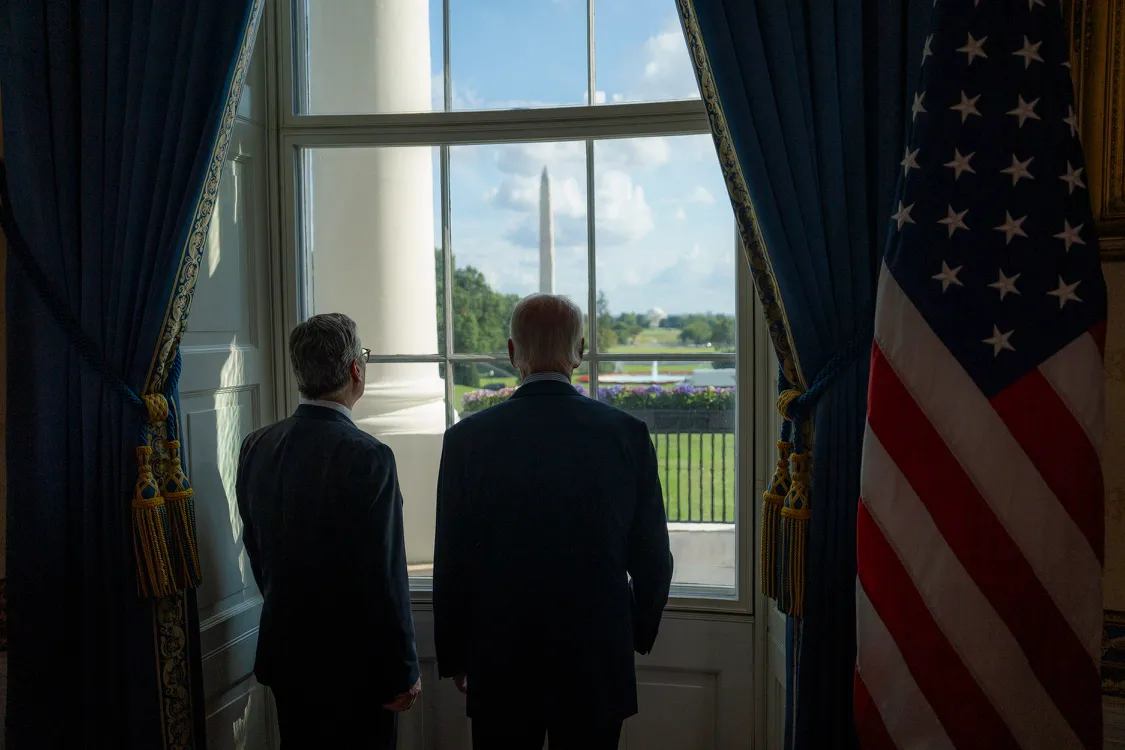The Sept. 13 White House meeting of President Joe “Collective” Biden and U.K. Prime Minister Keir Starmer was very short, with no press conference, and a White House readout of one paragraph. According to the U.S. account, the two national leaders went through a litany of joint agreements recommitting to indefinite war and conflict: “iron-clad” backing of Israel, “unwavering” support for Ukraine; “serious concern” and antagonism to Russia, China, Iran and North Korea, and so on.
Missing was any dire statement of approval by the U.S. and U.K. for Ukraine to conduct long-range missile strikes into Russia, but recall: no U.S. official had confirmed in advance that it would be the case. The issue is still “in play” as the jargon has it. Today’s Newsweek reports that Starmer expects to make his big announcement about U.K. approval for Ukraine to use its Storm Shadow missiles against Russia, sometime at the UN General Assembly later this month.
However, in no way does any of that mean the danger is off the table of war escalation to the point of nuclear World War III. The question is still very much alive of U.S./U.K. approval for Ukraine to use their weaponry for attacks far into Russia.
Today in Germany, Defense Minister Boris Pistorius commented that “international law” already allows such attacks. A spokesman for Pistorius’ Social Democratic Party said the same thing.
Such is depraved denial in the face of reality. Russian President Vladimir Putin made starkly clear Sept. 12, what the consequences are of Western approval for Ukraine’s long-range attacks: It will mean NATO is waging direct war on Russia.
Today in Moscow, Deputy Foreign Minister Sergei Ryabkov reiterated that, according to TASS, “The Russian President has said everything on this topic. The decision [to allow Kiev to strike] is there, all the carte blanche indulgences have been issued to Kiev’s clients. Therefore, we will respond in a brutal way. There is an element of serious risk here, because the opponents in Washington, London and other places clearly underestimate the degree of danger of the game they continue to play.”
Russian Security Council Deputy Chairman Dmitry Medvedev warned today on his Telegram channel, that “Russia is showing patience. After all, it is obvious that a nuclear response is an extremely difficult decision with irreversible consequences, but any patience comes to an end.”
More than ever, now is the time to escalate warnings of the imminence of all-out, and nuclear war, if the present Western course of insanity is not stopped. The way is wide open to amplify these warnings through the platform of the International Peace Coalition, in particular. Yesterday’s weekly deliberations, for the 67th week, streamed live to some 1,100 people in 40 countries, and continues to reach tens of thousands in follow-on viewing. Pre-eminent nuclear weapons expert Ted Postol, MIT emeritus, presented an illustrated report on the threat to Germany in particular.
With the truth getting out, and the mobilization increasing against the war danger, no wonder the big U.S./U.K. event in Washington, D.C., on Sept. 13 did not take place at the White House, but at the State Department. Secretary of State Antony Blinken gave a press briefing, and a five-page fact sheet was released, focused on announcing both specific U.S. actions against the RT (formerly “Russia Today”) international news network, and a broad, global drive to expose and shut down all dissent the U.S. claims is serving the “malign” purposes of Russia.
U.S. charges against RT do not refer simply to a local office or branch in the U.S., e.g. Florida RT reporters, who were recently raided. The U.S. charges, including that of coordinating with the Kremlin, are also aimed against Rossiya Segodnya, “a Russian state-owned and state-funded broadcast agency headquartered in Moscow.”
The fact sheet, titled “Alerting the World to RT’s Global Covert Activities,” begins, “Today the United States is designating three entities and two individuals for their connection to Russia’s destabilizing actions abroad. … [W]e now know that RT moved beyond being simply a media outlet and has been an entity with cyber influence, and military procurement. These operations are targeting countries around the world, including in Europe, Africa, and North and South America.”
Blinken referred to the tripartite collaboration on this global censorship campaign that is underway by the U.K., Canada, and the U.S. State Department’s Global Engagement Center. The fact sheet features dossier-like charges against Russia’s subversion in Moldova affecting the October 2024 elections, and also identifies situations in France, Germany and Argentina.
Among the three entities and two individuals charged by the U.S. yesterday, are: Rossiya Segodnya (see above); TV-Novosti, described in the fact sheet as, “a federally funded organization associated with Rossiya Segodnya and controls the RT media channel; Dimitry Konstantinovich Kiselev, described as the Director General of Rossiya Segodnya since 2013; and another person.
Sweeping actions are now authorized against these named parties. The fact sheet describes its penalties as in accordance with Executive Order 14024. In short, “all property and interests in property of the designated persons described above that are in the United States … are blocked and must be reported to the Department of Treasury’s Office of Foreign Assets Control.…” Those with secondary interests in the property of these persons—defined by the U.S. authorities—are also subject to sanctions, seizure, and blocking of their ownership or activity.
Thus, the State Department has proclaimed with these statements and actions that it can justify any and all suppression and prosecution of anyone they target, taking it as far as they can get away with politically.
How to respond to this? How to respond to the Coalition of the Mad and Damned? Escalate warnings of the war danger. Join in with the International Peace Coalition in the drive for international dialogue on the principles and programs for peace and security, to soon replace the deadly war paradigm.







